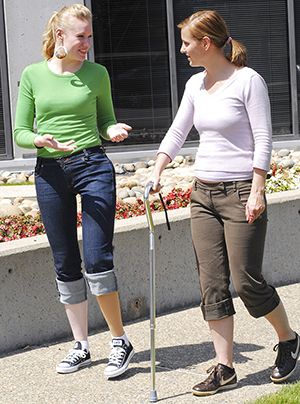Adjusting to Limb Loss
Losing a limb can be a profound shock. Everyone reacts to loss in different ways. You may be feeling angry, frustrated, scared, sad, or lonely. These are very common feelings after limb loss. In fact, many people go through distinct stages of grieving. Only you know how you feel. But don’t hesitate to ask for the emotional support that you need. You don’t have to go through this time of adjustment alone.
Stages of grieving
Grief is a complex emotion. It's a normal reaction to any kind of loss. It may begin right away after limb loss. Or you may not really feel grief until later in recovery. The process of grieving can be broken into five stages. They may happen in any order. You may feel one stage more strongly than others, or get “stuck” in a stage. Learn to recognize the stages of grieving:
-
Denial (“This can’t be happening to me.”)
-
Anger (“Why is this happening to me?”)
-
Bargaining (“I promise to be good if only I can have my old life back.”)
-
Depression (“I’ll never be normal or OK again.”)
-
Acceptance (“I’ll find a way to move on with my life.”)
Adjusting to a new body image
We all see ourselves a certain way. After limb loss, your self-image may be altered. Accepting the changes to your body will take time. Keep in mind that losing a limb doesn’t make you a less valuable person. As you go through your physical recovery, allow yourself emotional, mental, and spiritual recovery time, too. Take as much time as you need, but commit to accepting and caring for your body.
Intimacy after limb loss
Sex is a normal part of any intimate relationship. A loss of a limb can cause changes that can affect your ability or desire to have sex. These changes can be both physical and emotional. It may take some time before you feel ready to have sex again. These tips can help you work with your partner to rebuild intimacy and find ways to enjoy sex again:
-
Talk openly with your partner about your fears and concerns. Also allow your partner to do the same with you. This may help you stay connected with each other. It also helps reduce stress and negative emotions, such as anger and resentment. These emotions can build up over time and cause problems if they’re not addressed.
-
When your healthcare provider has said it is OK to have sex, and you and your partner are ready to resume sex, start slowly. Remember that there are many ways to show that you love and care for each other.
-
Before sex, try to look and feel your best. Wear clothing that is comfortable and easy to remove.
-
Choose a time to have sex when you both feel rested. Also choose a place where you can relax and won’t be interrupted.
-
Don’t rush. Take the time to enjoy yourselves and become aroused. Caress, touch, hold, or hug and kiss each other. Massage each other with oils or lotions. These activities can help build excitement before sex. They can also help you feel wanted and close even if you don’t have sex.
-
After the loss of a limb, you and your partner may want to find different positions that are more comfortable. Explore finding positions that work best for you and your partner.
-
If you and your partner are having problems resuming sex, it’s OK to seek outside help. Try talking with your healthcare team or counselor.
You’re not alone
 |
| Spending time with a peer counselor may help you feel more comfortable with your new body image. |
Asking for help can be hard. But everyone needs support from time to time. Don’t let limb loss isolate you. Reach out. Ask for the support and assistance that you need. These people and organizations can support you:
-
Peer counselors. These are people living with amputation who are willing to share their own experiences. Talking with a person who’s been through an amputation can be a great help.
-
Family and friends. People who love and care for you really want to help. Tell them what you need and how you feel.
-
Psychologists or other therapists. Therapy can help you work through the adjustment process.
-
The Amputee Coalition. This nonprofit group provides resources and support. Find them online at Amputee Coalition or call 888-267-5669, ext. 1.
Notes for family and friends
While you can support your loved one’s recovery in many ways, emotional support is vital. Your family member will need understanding and patience. But don’t be afraid to encourage them to get back into a routine. Listen closely to what they tell you. Ask questions and voice concerns. Some sadness is normal, but watch for signs of depression. Contact a trained therapist if your loved one:
-
Feels overwhelming or unrelenting sadness
-
Doesn’t find pleasure in anything
-
Won’t accept the reality of limb loss
-
Won’t touch their residual limb or get out of the wheelchair
-
Won’t see or talk to friends or family
Online Medical Reviewer:
Rahul Banerjee MD
Online Medical Reviewer:
Raymond Turley Jr PA-C
Online Medical Reviewer:
Stacey Wojcik MBA BSN RN
Date Last Reviewed:
7/1/2023
© 2000-2025 The StayWell Company, LLC. All rights reserved. This information is not intended as a substitute for professional medical care. Always follow your healthcare professional's instructions.